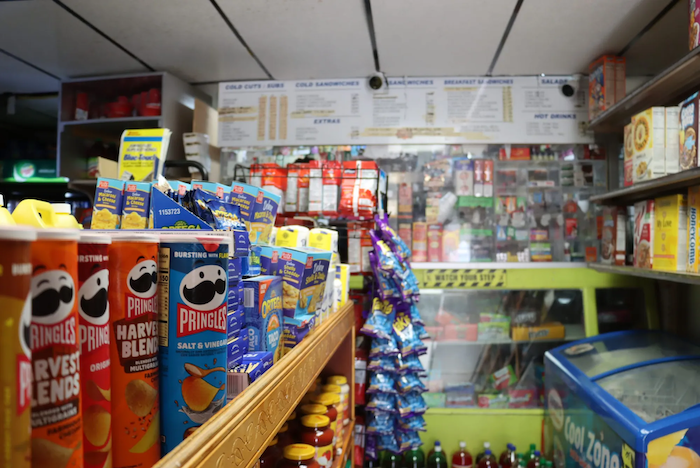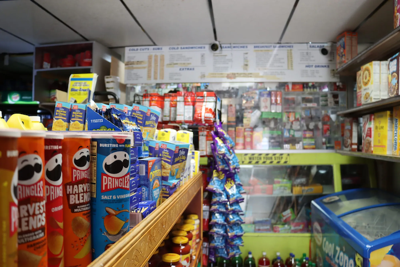(Spotlight Delaware is a community-powered, collaborative, nonprofit newsroom covering the First State. Learn more at spotlightdelaware.org).
The Wilmington City Council will consider an ordinance that would temporarily ban the opening of new convenience stores and liquor stores in the city until an assessment can be done to determine their health and safety impacts on surrounding communities.


The proposal follows years of concerns expressed by community members who say too many corner stores sell unhealthy foods, attract crime, or don’t listen to community input.
“We do need stores, but not if they’re going to condone illegal activities in front of their stores,” said Joyce Woodlen, a Hilltop resident and local hair boutique owner.
Late last month, City Councilwoman Shané Darby proposed the ordinance, telling Spotlight Delaware, “we want stores that are meaningful in our community.”
But, on Friday, a spokeswoman for Mayor John Carney’s office said the proposal may not be feasible, asserting that the city’s land use department does not have the capacity to complete a study that assesses the impacts of corner stores.
“A project of that scope would need a dedicated budget line item to support external consulting, and we don’t know what a contract of that nature would cost,” the spokeswoman, Caroline Klinger, said in an emailed statement to Spotlight Delaware.
In response, Darby on Friday said that she is still moving forward with her proposal. She called the city’s response a “classic line,” and claimed that Carney finds money for initiatives that are a priority to his administration.
“They need to find the money,” she said. “But we don’t want any more corner stores, and we don’t want any more liquor stores.”
 Wilmington City Councilmember Shané Darby has sought to impact quality of life issues in her city, including a bill to assess the impacts of corner stores. | PHOTO COURTESY OF WILMINGTON CITY COUNCIL
Wilmington City Councilmember Shané Darby has sought to impact quality of life issues in her city, including a bill to assess the impacts of corner stores. | PHOTO COURTESY OF WILMINGTON CITY COUNCILDarby’s ordinance further claims that there is an oversaturation of corner stores, with many of them selling “processed and unhealthy foods, tobacco, and lottery tickets.”
Those “contribute to the perpetuation of food deserts, public safety concerns, and economic disinvestment in Black and Brown communities,” the ordinance states.
Results of the “equity assessment” required by the ordinance would be used to change policies. Those could include requiring community input on proposals for new corner businesses, creating buffer zones between stores, capping the number of corner stores in a neighborhood, or prioritizing businesses that bring in healthier foods, according to the ordinance.
Darby said the assessment would not have any effects on existing businesses.
The ordinance will be discussed in further detail on Sept. 11 at City Council’s Community Development & Urban Planning Committee Meeting.
Klinger, Carney’s spokeswoman, said the mayor wants to see healthier food options in the city and is willing to work with city council. She noted that the city is currently working with Widener University on a project that could either require or incentivize bodegas to stock local produce.
“If these stores are the most accessible food option for residents, making them healthier could be more impactful than eliminating the establishment of new ones,” Klinger said in the city’s statement.
Darby said her ordinance arose from community concerns she has heard over time about local corner stores. Still, not all community members agree that temporarily banning new stores is the answer.
Iz Balleto, a longtime community advocate and cultural program director for the Delaware Art Museum, believes there should be more corner stores in the city, saying they provide cheap meals and convenience for residents who can’t always find their way to a grocery store.
He also said he hopes city council members know “what they’re truly doing.”
“Just because they’re comfortable in their situation or seats. They might have the luxury to shop where they want to, but that does not mean the people who are in the inner city have that same luxury,” he said.
Trouble down the block
In Hilltop, hair boutique owner Woodlen remembers the trouble that came with a convenience store down the block, where groups of young men lingered outside for months.
She said it took half a year before authorities finally addressed the issue. She also stressed that not all stores invite such behavior, but when owners allow loitering, the problems linger.
 Joyce Woodlen of Hilltop remembers the trouble that came with a convenience store down the block, where groups of young men lingered outside for months. | SPOTLIGHT DELAWARE PHOTO BY BRIANNA HILL
Joyce Woodlen of Hilltop remembers the trouble that came with a convenience store down the block, where groups of young men lingered outside for months. | SPOTLIGHT DELAWARE PHOTO BY BRIANNA HILL“I hope that they never open up another corner store in our neighborhood,” Woodlen said.
Darby’s corner store proposal has already garnered support from some of her colleagues, including council members Maria Cabrera, Coby Owens, and Zanthia Oliver.
Oliver previously made a proposal to the city council in 2021 that would have forced corner stores to close between 10 p.m. and 4 a.m. The ordinance never became law.
Oliver argues that many corner stores perpetuate loitering and criminal activity and fail to make meaningful investments in the community.
“I think we need to really shut some of them down. They don’t support us. I don’t see why we support them. So I say, ‘Do away with them,’” she said.
Cabrera, who is co-sponsoring Darby’s proposal, also emphasized the need for better nuisance laws and enforcement, noting the inconsistencies in penalties against stores that cause issues.
Cabrera highlighted a previous incident in 2019 when Wilmington police shut down a local Eastside neighborhood store called Bill’s Deli Market after six people were shot nearby.
Some said the store had become a nuisance property, and it had been cited for health and building code violations, as well as for improperly placed trash, as reported by The News Journal.
A week after it was shut down, the store reopened.

Bill’s Deli Market employees declined to be interviewed for this story.
Cabrera said she sympathizes with responsible business owners, adding that loitering has been harder to address since the city settled a lawsuit over the policing of homeless people with the ACLU of Delaware – an agreement that barred local police from arresting people for panhandling or lingering in public areas.
When reached for comment, Councilman James Spadola, the sole Republican on the council, did not voice outward opposition to Darby’s proposal. But he said he worries it could hinder the establishment of productive businesses and potentially prolong vacant storefronts, which he says are already problematic.
Produce often goes bad
Some business owners say that they understand the city’s concerns, but say they can only do so much to address the problems.
Rebecca Gomez, a Hilltop resident who has owned the Dominican Cafe Mini Market and Food for more than two years. believes reform is needed, but argues that it should not start with corner stores.
Gomez said she has tried to stock healthier foods for the community, even investing in a refrigerated shelf for fresh produce. But she noted those items haven’t always been as popular as the snack foods that dominate sales. As a result, the fruits and vegetables often go bad.
 Rebecca Gomez, a Hilltop resident and owner of the Dominican Cafe Mini Market and Food. | SPOTLIGHT DELAWARE PHOTO BY BRIANNA HILL
Rebecca Gomez, a Hilltop resident and owner of the Dominican Cafe Mini Market and Food. | SPOTLIGHT DELAWARE PHOTO BY BRIANNA HILL“If you offer them good food, like healthy food, they’re gonna go for whatever is cheap and convenient for them. Like, that’s all they know,” Gomez said.
A 2017 study from the National Bureau of Economic Research found that adding a supermarket in food deserts reduced nutritional inequality by only 9%, while the remaining 90% stemmed from differences in demand, habits, cultural preferences, and other socio-economic factors.
At Young’s Sub Shop near the Mid-Town Brandywine neighborhood, the store manager said he also has struggled to sell fresh foods before they spoil. Asked about community concerns about public safety, he said it is tough to keep people from loitering or from stealing from his store.
“We can’t do anything about it. If we call the cops, cops don’t come – only 40 to 30 minutes later,” said the store manager who only provided his first name as Muhammad.













(0) comments
Welcome to the discussion.
Log In
Keep it Clean. Please avoid obscene, vulgar, lewd, racist or sexually-oriented language.
PLEASE TURN OFF YOUR CAPS LOCK.
Don't Threaten. Threats of harming another person will not be tolerated.
Be Truthful. Don't knowingly lie about anyone or anything.
Be Nice. No racism, sexism or any sort of -ism that is degrading to another person.
Be Proactive. Use the 'Report' link on each comment to let us know of abusive posts.
Share with Us. We'd love to hear eyewitness accounts, the history behind an article.